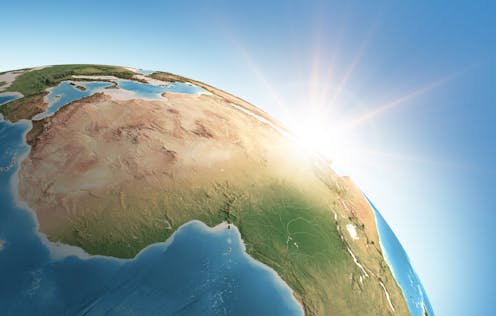
Côte d’Ivoire has announced plans to launch its first satellite within the next two years. A team of scientists in the fields of astrophysics and geology tell The Conversation Africa about the potential benefits of this development and how the country plans to realise its space industry ambitions.
What kind of satellite does Côte d'Ivoire plan to launch?
YAM-SAT-CI 01 will be a nanosatellite for the observation of the Earth. A nanosatellite is a small satellite, weighing from 1kg to 10kg. It will be equipped with a camera which can provide images of the coast, forests, natural parks and urban areas of the country.
The construction of the satellite is 100% Ivorian. It has been entrusted to Universal Konstructors Associated, a private Ivorian company promoting scientific and technological development in Côte d'Ivoire, in partnership with the Institut National Polytechnique Félix Houphouët-Boigny of Yamoussoukro.
It’s the first step towards more sophisticated satellites and sensors which have many applications. For example they can detect, monitor and map threats to national security, illegal migration, deforestation, illegal gold mining activities, soil humidity and water reservoirs. They can help minimise the consequences of floods or droughts.
In Côte d’Ivoire, such a satellite could assist the government’s efforts to regulate artisanal mining and combat illegal activities and destruction of the environment.
These applications rely on sophisticated image processing algorithms, including the use of artificial intelligence.
What are the other potential benefits and spinoffs?
Earth observation provides data for agriculture, disaster management and urban planning. The satellite supports various applications, including monitoring vegetation health, mapping water resources, and analysing urban growth patterns.
Aside from the technology’s direct benefits, it serves the scientific and economic development of the nation.
The project of building and launching a satellite is generally accompanied by capacity building in many sectors related to the space industry. It involves engineers and scientists to develop sensors and the ground segment to track and communicate with the satellite.
Other important benefits of such projects include a wider use of space-science technology. A satellite launch may lead to greater use of Earth observations data and products, provided by numerous satellites orbiting around our planet.
Who will be involved in this project?
The academic and private sectors all have a role to play in this scientific, technical and political adventure.
The Institut National Polytechnique Félix Houphouet-Boigny has already planned to set up new curricula in the domain of space and aeronautics. This will directly benefit a new generation of young engineers. And an Ivoirian Association for Astronomy has been launched. Its outreach activities to promote astronomy and space science to the wider public will increase the scientific literacy of the population. It may inspire the younger generation towards scientific careers.
Lastly, the University Félix Houphouët-Boigny has a laboratory specialising in the observation of the Earth from space: the Centre Universitaire de Recherche et d'Application en Télédétection. Its students may also contribute to the design, mission strategy and applications of Côte d’Ivoire’s satellites.
What are other African countries doing in space technology?
The 2022 space industry report of the consulting company Space in Africa says the value of the industry in Africa is expected to reach US$22.64 billion in 2026. That’s up from US$19.49 billion in 2021. The report indicates that African nations allocated US$534.9 million to space programmes in 2022 compared to US$523.2 million in 2021. These investments indicate that African countries are preparing for wider use of space technology in handling challenges affecting the continent.
For instance, on 23 April 2023 Kenya launched its first satellite, called Taifa-1, with the help of SpaceX. The satellite is equipped with an optical camera and is expected to provide agricultural and environmental monitoring data for Kenya.
In 2021, Tunisia launched its first 100% Tunisian-made satellite. Zimbabwe, Uganda, Egypt and Angola have also launched satellites in the last 12 months. In April 2023, President Macky Sall announced the launch of the Senegalese Agency of Space Studies.
Egypt, Nigeria and South Africa are the most advanced African countries on space issues. For instance, ZACube, launched in December 2018, is a nanosatellite developed by the South African National Space Agency and local universities. It focuses on the safety of maritime traffic in South African coastal waters.
Nigeria’s National Space Research and Development Agency was established in 1999. It has launched five satellites since 2003. In December 2022, Nigeria and Rwanda became the first African countries to sign the Artemis Accords, a NASA-led framework outlining best practices for sustainable space exploration.
It’s clear that more and more African countries are investing in space technologies.
The first step is to educate the population about space and the benefits of investing in space technologies. We need to create space-related training courses and promote space science in African countries.
David Baratoux receives funding from French National Research Institute for Sustainable Development and from the Centre National de la Recherche Scientifique (France)
Aziz Diaby Kassamba is affiliated with Université Félix Houphouët-Boigny and Association Ivoirienne d'Astronomie.
Marc Harris Yao Fortune, Marie Korsaga, and Pancrace Aka do not work for, consult, own shares in or receive funding from any company or organisation that would benefit from this article, and have disclosed no relevant affiliations beyond their academic appointment.
This article was originally published on The Conversation. Read the original article.







